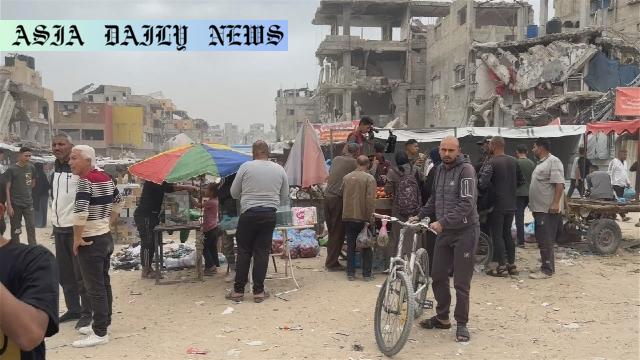Humanitarian Crisis: Israel’s blockade leaves Gaza without food, fuel, or medical supplies, sparking escalating concerns.
- Key Point 1: The humanitarian crisis in Gaza worsens due to a month-long Israeli blockade.
- Key Point 2: Food, fuel, and medical supplies are critically lacking, with bakeries and clinics shut down.
- Key Point 3: Airstrikes on civilian areas compound the crisis and raise tensions.

Humanitarian Blockade and Its Dire Consequences
The Gaza Strip is enduring one of the harshest humanitarian crises in recent history as Israel’s blockade of food, fuel, and other essential supplies stretches into its second month. The blockade, initiated on March 2, aims to pressure Hamas. However, it has had devastating consequences for the enclave’s 2 million residents, many of whom rely on international aid to survive. Without deliveries of critical supplies, daily living has become a struggle for ordinary citizens. For example, all 25 bakeries supported by the World Food Programme have ceased operations, leaving thousands without access to even the most basic staple: bread.
Medical Supplies and Civilian Suffering
The international organization Doctors Without Borders has also reported an acute shortage of medical supplies. Without proper access to medication and medical equipment, hospitals and clinics struggle to serve the healthcare needs of the population. Complicating the dire situation further, reports indicate that Israeli airstrikes have targeted civilian areas, including a UN clinic in Jabalia. These attacks have led to the deaths of over 20 displaced individuals, further inflaming tensions. The compounded effect of the blockade and these strikes leaves Gaza’s residents trapped in a scene of worsening despair.
Failures of Negotiations and Escalating Conflict
Efforts to negotiate a ceasefire between Israel and Hamas have faltered, leading to intensified military campaigns. This escalation places additional pressure on Palestinians already living under blockade conditions. With negotiations at a standstill and no resolution in sight, there is a dire need for international intervention to address the deteriorating conditions. Global organizations and countries must unite to urge both sides to prioritize humanitarian considerations, especially in the face of widespread suffering caused by the actions of military forces and political disputes.
Global Responsibility and Urgent Need for Action
The situation in Gaza is not simply a regional issue; it reflects the broader responsibilities of the global community. The world must recognize the urgent need to alleviate the suffering of Gaza’s residents. NGOs and international bodies, such as the United Nations, are under pressure to negotiate a peaceful outcome while ensuring that essential relief supplies reach those in need. Without immediate action, the humanitarian crisis could deteriorate further, potentially leading to catastrophes that will be much harder to resolve in the long term.



Commentary
The Tragic Consequences of Prolonged Blockades
The humanitarian situation in Gaza has reached a breaking point. The month-long blockade imposed by Israel has strangled the flow of essential supplies, leaving millions vulnerable. The suffering of civilians, including children and families, underscores the high price of political disputes. Food shortages mean malnutrition is quickly becoming a reality, and medical supply shortages exacerbate an already overwhelmed healthcare sector. The international community must question whether such measures, aimed at pressuring Hamas, justify the level of human suffering inflicted on innocent individuals.
The Role of International Organizations Amidst Crisis
Doctors Without Borders and the World Food Programme have been at the forefront of providing relief to Gaza’s residents, but even their efforts have been stymied. With bakeries shutting down and medical agencies reporting critical shortages, the gaps in aid are glaring. This reflects the need for better coordination and support from global actors. The ability of international organizations to operate effectively during such crises is critical. Yet, the prolonged conflict has shown that they are often hamstrung by geopolitical obstacles and the inability of world leaders to find common ground on significant issues like this one.
The Need for Accountability and Peace Initiatives
While the crisis in Gaza is undoubtedly complex, there needs to be accountability from all parties involved. Both Israel and Hamas have a responsibility to ensure the safety and well-being of civilians. Airstrikes targeting displaced people and blockades that cut off essential resources are blatant violations of human rights. The global community must advocate for not just an end to the violence but also active measures to rebuild Gaza’s infrastructure and economy. It’s time to go beyond condemnation and rhetoric – we need long-term solutions that prioritize human dignity and peace.